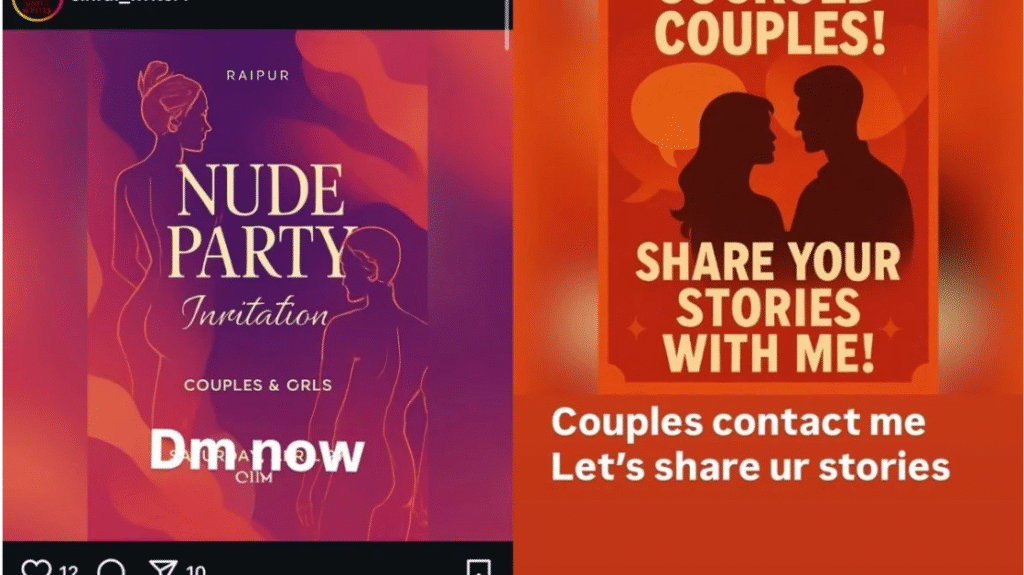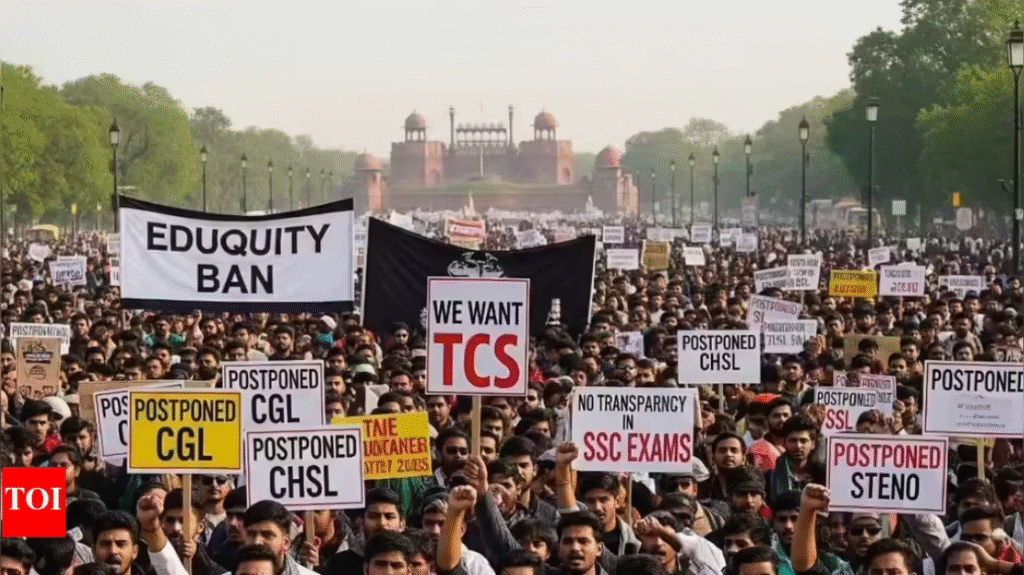A wave of disbelief and anger swept Raipur this week when posters advertising a “nude party” went viral, offering entry fees of ₹40,000 to ₹1 Lakh, overnight stays, and enticing promises for privacy and excess. What was planned for 21 September by the “Aparichit Club” at an SS Farmhouse has now become a contentious spectacle. After massive public backlash, police moved swiftly: several organisers were arrested, the Chhattisgarh State Women’s Commission demanded action, and political leaders are trading blame.
The Raipur Nude Party – What Was Proposed & How It Unfolded
- The event was advertised with offers of entry starting at ₹40,000, possibly rising to ₹1 Lakh, with amenities like liquor, overnight stay, and a “private stranger party” vibe. The promotional material suggested strict dress-optional rules— “attend without clothes.”
- Posters began going viral on social media around 12 September, referring to the venue at an SS Farmhouse in Bhata Gaon. Though the exact venue was vague, the timing and promises stirred significant controversy.

Swift Legal Response & Arrests
- As public outrage mounted and political voices demanded action, the Raipur Police detained six organisers including Hyper Club manager James Back, Santosh Jewani, Ajay Mahapatra, SS Gupta, Tinu Singh and Devendra. They are under investigation.
- The Chhattisgarh State Women’s Commission, led by Dr. Kiranmayi Nayak, took suo motu notice. The Commission ordered that Raipur SSP and the Cyber Cell chief produce a detailed report within 48 hours, and issue daily updates until all involved persons are identified and action is taken.
Legal Provisions Under Scrutiny
Obscenity & Posting in Public/Digital Domain
- Under Section 294 of the Indian Penal Code (IPC), acts of obscene behavior in public places are punishable. The public display of posters urging nudity may be interpreted as contravening this law.
- The Information Technology Act, 2000, especially Section 67, penalises publishing or transmitting obscene or sexually explicit content online. Since the posters were shared and promoted via social media, this law is central to the case.
- Also relevant is the Indecent Representation of Women (Prohibition) Act, 1986, which prohibits indecent content that offends moral sensibilities.
Licensing, Permits & Venue Regulations
- If the party included liquor, overnight stay, or was held at a farm or venue without proper permits, organisers may also face violations of local licensing and public safety laws.
- Venue owner(s) could be held liable for allowing or facilitating an event that could violate public decency laws or local ordinances.
Politics, Morality & Public Outcry
- Opposition parties like Congress sharply criticized state government, alleging negligence and moral collapse under current leadership. They demanded strict punitive action.
- The BJP, while condemning the proposed event, also accused opponents of politicising the issue. State authorities promised zero tolerance. Deputy CM Vijay Sharma said such events will not be permitted.
- Some citizens expressed shock and concern for the erosion of cultural values; others warned about the slippery slope of sensationalism in club / party culture being normalized.
What’s At Stake Legally & Socially
- Freedom vs Morality: A core issue is the tension between personal liberty / expression and community moral standards. How far does constitutional right to privacy or expression stretch when something is deemed ‘obscene’ or morally unacceptable by many?
- Precedents: Previous Indian court rulings (e.g. on obscenity or protests) have used community standards, intent, degree of harm and public decency in deciding whether content crosses legal boundaries.
- Digital Footprint: The evidence in this case (social media posts, promoters’ messages, digital promotions) will heavily influence outcomes. Digital record preservation, deletion, moderators’ roles could be under scrutiny.
- Punishments: Convictions under IPC 294, IT Act Section 67, Indecent Representation Act can result in fines, imprisonment, or both. Venue owners / promoters could also lose licenses and face seizure or cancellation of permits.
What Officials Say & Next Steps
- The Women’s Commission wants an apology from organisers and their families.
- Police are investigating not just the organisers, but also people involved in promotion, social media posters, sponsors. Venue owners may become part of probe.
- Authorities are examining whether the event was planned to obtain illegal funds (entry fees), whether liquor and drugs were part of the promise, and whether safety norms were to be violated.
What This Means: Potential Legal & Cultural Ripple Effects
- A strong investigation and legal action could set a precedent for how social media-promoted events are regulated.
- Poster campaigns that promise morally or legally questionable content may find stricter policing in digital and offline domains.
- Could prompt legislative review of gaps in licensing laws, social media content regulation, community standards around events.
- Cultural discourse may shift: how far society tolerates or rejects events deemed obscene; role of local norms vs global party culture.
Conclusion
The “Raipur Nude Party” saga is more than scandalous headlines—it raises serious legal, moral, and social questions. From obscenity laws to digital promotion, licensing, and the balance between freedom and decency, this case is likely to be closely watched. Arrests have already begun, authorities are on high alert, and the public is demanding accountability.
What remains to be seen is how the legal machinery interprets this case: Will it treat these posters as mere publicity gone awry, or as a breach of laws meant to protect public morality and decency?
To read more Indian Laws and news, visit Legal Guide India



